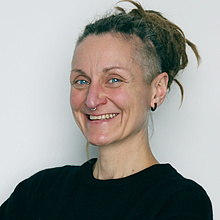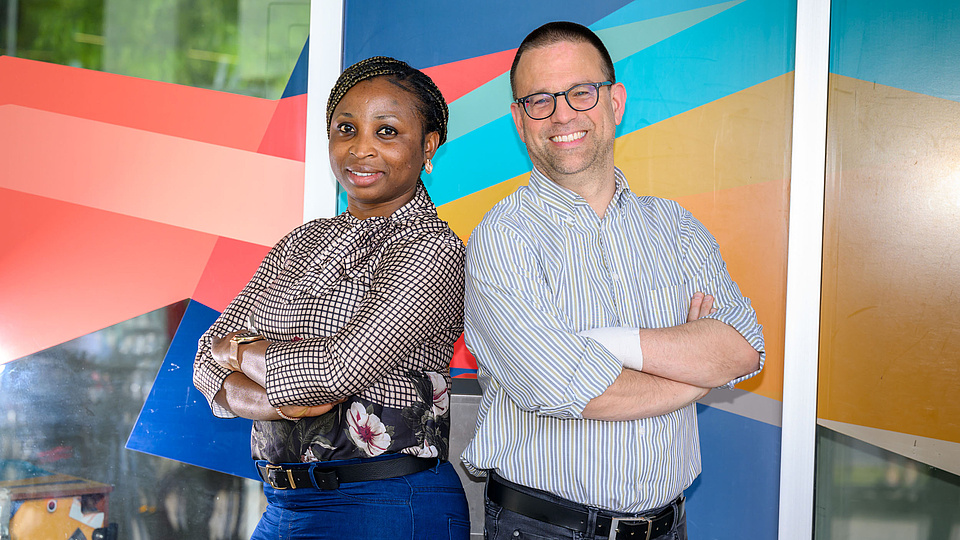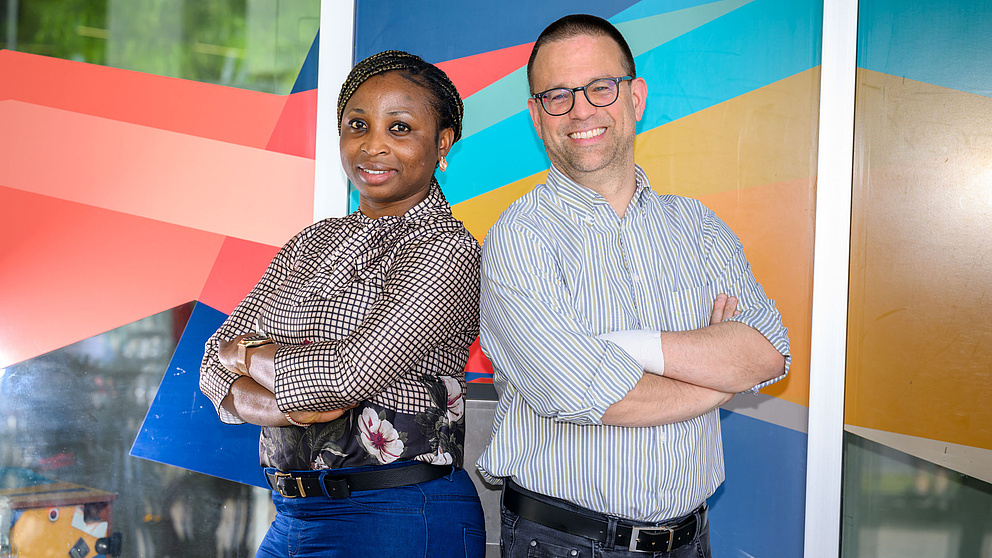Jump to the content
- {{#headlines}}
- {{title}} {{/headlines}}
Would you like to learn more about the programmes and find out how you can benefit as a host? Join our online event to receive first-hand information about the funding programmes and the application process.
The next info event will take place on 22nd January 2026: Humboldt Discovery – Become a host
Science needs networks – become a Humboldt host!
Encourage international junior researchers to apply for a Humboldt Foundation fellowship. Or nominate an eminent researcher as the partner of your choice for a research award. If you are a member of the Humboldt Network abroad, you can host researchers from Germany. See here for further information.
The Humboldt Foundation’s raft of programmes addresses various target groups at different career stages. The Humboldt Research Fellowship, for example, is designed for outstandingly qualified researchers worldwide – from postdocs to established researchers – who would like to cooperate with a host in Germany. The Feodor Lynen Research Fellowship is granted to researchers from Germany who want to spend time working together with a member of the Humboldt Network abroad. And the Georg Forster Research Fellowship enables researchers from emerging economies and developing countries to conduct research on a development-related topic in Germany.
If you hold a professorship or comparable executive position in Germany, are well connected internationally, have experience of promoting junior researchers and would like to cooperate with particularly gifted international research talents, apply to become a scout for the Henriette Herz Scouting Programme. As a scout, you can directly recommend up to three candidates with whom you would like to cooperate for a Humboldt Research Fellowship in Germany. The programme is designed to enable you to recruit highly sought-after researchers, for example in research areas that are in great demand. The quality standards in the scouting programme are the same as those for candidates applying for the Humboldt Research Fellowship Programme. Twelve months after sponsorship has come to an end, the fellows sponsored will undergo an ex-post evaluation.
The Humboldt Foundation’s various research awards enable you to cooperate with top researchers from all over the world. Our award programmes also address various target groups: The Humboldt Research Award, for example, valued at € 60,000, is granted to internationally renowned researchers from abroad in recognition of their body of work. The award winners are invited to spend up to a year in Germany conducting the research of their choice in cooperation with you as their host. This period can be divided up. The provisions of the Georg Forster Research Award are similar. It honours internationally recognised researchers from emerging economies and developing countries who work on development-related topics.
The Alexander von Humboldt Professorship supports universities in Germany with their strategic (re)orientation: the programme seeks to recruit researchers in the international vanguard to conduct research in Germany on a long-term basis. Recommend the best and most compatible international colleagues to your university leadership and thereby help to take your university to the very highest level. The award amount of up to € 5 million is made available for a period of five years. If you have any questions about nominating a Humboldt Professor, please turn to us – we will be pleased to advise you.

"As a scout, I have the opportunity to enable outstanding young scientists from less privileged regions of the world to connect to the global scientific community. This is a small contribution to global equal opportunities." more
The principles that guide us
We want the best:
The Humboldt Foundation aims to recruit outstanding research personalities at all career stages for its network. That is why the only things that count are the applicants’ and nominees’ previous academic record and their future potential.
We promote people, not projects:
All Humboldtians conduct their research independently. We support them unbureaucratically and make no stipulations on the part of the Foundation.
We are globally successful:
Every year, the Humboldt Foundation grants over 700 fellowships and awards. Our network now embraces more than 30,000 Humboldtians in no fewer than 140 countries and disciplines – including 63 Nobel Prize winners.
Everyone is welcome:
Equal opportunities and diversity are important pillars of the Humboldt Foundation’s funding policies. The Foundation aims to achieve a good balance between genders and a high level of diversity among its fellows in all areas.
We think sustainably:
The Humboldt Foundation promotes every Humboldtian’s career and path in life on a long-term basis so that they can sustainably foster and expand their academic and personal contacts.

Your advantages as a host in Germany
Cooperation with outstanding international researchers gives both you and your research as well as your research institution fresh professional – and indeed human – impetus. At the same time, in your role as a scientific host, you become part of the Alexander von Humboldt Foundation’s global network where you can make and foster contacts worldwide.
You can apply for a subsidy towards research costs to finance equipment, laboratory materials, computers, support staff, administrative costs or similar. It helps you and your guest create optimum conditions for productive cooperation. You and your research institution receive a monthly allowance of €800 (natural and engineering sciences) or €500 (humanities and social sciences). And even after the research stay has come to an end, we continue helping you to sustain your links with your academic partner, for example through reciprocal working visits or a further research stay.
The subsidy is intended to help cover research-related costs, including administrative costs directly ensuing from the research being carried out.
Examples: laboratory materials, procuring scientific equipment, computers, project-specific literature and software, interlibrary loans, project-related travel/lectures/excursions, workshops, telephone costs, copies, postage, assistants, etc.
For more information on the subsidy towards research costs please see the information sheet (PDF, German language only).
The subsidy towards research costs can only be requested by the academic hosts of foreign research fellows in accordance with the guidelines for the respective fellowship programme. The Humboldt Foundation will notify eligible hosts of this option when the fellowship is awarded.
Before the sponsorship period begins the Humboldt Foundation will provide academic hosts with a personalised link through which they can request a subsidy towards research costs. After successfully logging in, the application can be made via an online form. The Foundation provides a separate application form for each fellow; you cannot use the same form for multiple fellows. Once you have accessed the form for the first time, it will be saved in My Humboldt on the website, from where you can open and continue filling it in at any time.
The fellow’s data and your data as a host are already pre-filled in the form.
To apply for the subsidy towards research costs, you will have to enter the appropriate bank account details and the purpose for which you are requesting the subsidy.
You will receive a subsidy towards research costs of 500 EUR per month for fellows in the humanities and social sciences or 800 EUR per month for fellows in the natural sciences and engineering.
The form also includes details of the sponsorship period; this period can be adjusted if necessary.
For data privacy reasons, the personalised link to the form should never be made available to third parties. The form can only be completed from the host’s personal account. Third parties (department staff, assistants etc.) are not authorised to complete the form. Applications submitted by third parties therefore cannot be processed.
After submitting the application form you will receive an email confirming that we have received your application; due to our high workload we are however unable to send approval or payment notices. The submitted online form, which can be accessed in My Humboldt on the website at all times, serves as confirmation.
The subsidy towards research costs can only be paid retroactively for the current financial year. No payments can be made for previous years, as the budgets for those years have already been finalised.
Multiple hosts can only receive the subsidy towards research costs for different periods of time. Please agree with the other hosts on who will receive the payment for which period.
Remaining funds from the subsidy towards research costs must be repaid promptly. Please notify us of the remaining amount; we will provide you with our account details and a payment reference for the repayment.
What are the duties of a host?
As an academic host you are there to give help and advice to the nominee or applicant. During the application phase, you have to provide binding confirmation that a research position will be made available as well as a confidential statement (see below). If the application is successful you will support your research fellow in conducting their research, both professionally and organisationally, or you will welcome your award winner when they come to Germany.
You are, however, also the main contact for personal matters such as finding accommodation or childcare issues. Please bear in mind that your guest may well need more than just professional advice to find their feet in a new country.
Six steps to becoming an academic host
- The prerequisites
Any researcher currently working at a research institution in Germany can host a researcher from abroad as a member of their team. Members of the Humboldt Network abroad can host researchers from Germany within the Feodor Lynen Research Fellowship. - The right guest
If you already know a promising junior research or an experienced researcher with whom you would like to cooperate, encourage them to apply to the Humboldt Foundation for a research fellowship. Or nominate a top international researcher for a research award and invite them to stay at your institute in Germany. If you do not have any particular researcher in mind, enquire after suitable candidates in your network or with specialist colleagues. These are often good sources of recommendations. - The research proposal
Applicants draw up their own, independent research proposal and coordinate with you as their academic host. The originality and innovativeness of the research proposal are two of the most important selection criteria, alongside the candidate’s academic career to date, the quality of their previous research and their potential for the future. When nominating someone for a research award, on the other hand, a detailed description of the joint research is not required. - The statement
Your confidential statement on the applicant’s qualifications and the research proposal is of crucial importance in the selection process. Moreover, we also need binding confirmation from you that a research position will be made available. When nominating someone for a research award, you will be expected to write an appreciation of the research personality you have nominated, explaining why they are eligible for the award.
The Humboldt Foundation believes that a person’s academic excellence is defined by their individual life journey and educational background. If you mention personal limitations or structural issues, e.g. difficult research conditions, gender-specific discrimination or cultural barriers to mobility, when writing your statement or laudation, they will be considered in favor of the application during the review process. - The selection
The entire review process usually takes from four to seven months. As a rule, we request two independent peer reviews for every application. The selection decision is taken by an independent committee composed of researchers from all disciplines. Their decision is based on a comparison of all the applications without invoking quotas for countries or subject areas.
An exception to the rule is the Henriette Herz Scouting Programme, where fellowships are granted directly. - The collaboration begins
When the guest of your choice receives one of the Alexander von Humboldt Foundation’s fellowships or awards – collaboration can begin. It is worthwhile mapping out your expectations of each other before your guest arrives in Germany. Clarify as many details about the research stay as possible – that is the ideal prerequisite for productive and successful cooperation.
We wish you every success!
Host Newsletter
Whether you are already a host or would like to become one, stay up to date with the latest news:
Our host newsletter provides you with regular updates on new funding opportunities offered by the Foundation, as well as valuable information on existing funding programmes and offers related to hosting Humboldt Fellows.
The newsletter is aimed exclusively at current and future hosts in Germany. For general information on the activities of the Humboldt Foundation, please subscribe to our Humboldt Newsletter.

